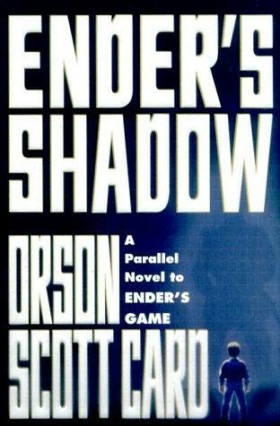 Author: Orson Scott Card
Author: Orson Scott Card
Original Publication: 1999
Started: 2010 Oct 16
Finished : 2010 Oct 24
Format: Kindle
8807 locations / 9 days
979 locations / day
So here we are, continuing the Ender Series. I had thought that I had read Books 1 to 4, but had never read any of the Shadow books that start with Book 5, Ender’s Shadow. Within seconds of starting the book however, I realized that I was wrong. I had indeed read Ender’s Shadow before. While I couldn’t really remember forward, and know for sure what was going to happen on the next page or the next chapter, I did get a strong sense of familiarity with every page I read, like ongoing deja vu. Which of course is in perfect alignment with me having read this before, but many years ago. Most likely not long after it came out in 1999.
In any case, this is essentially a retelling of the same story told in Ender’s Game, but told from the perspective of one of the minor characters in the original book, namely “Bean”. In some ways Bean ends up being a more interesting character than Ender himself, if only by the mere fact that he wasn’t seemingly always the best at everything (although still at many things) and therefore had do understand and deal with his secondary role. At the same time, he was more aware of the larger context of what was going on than Ender, who was pretty oblivious to some major things, of course including the major reveal at the end of the first book. Bean on the other hand, figured out what was really going on and undertook his actions fully knowing the consequences, which in some ways made those events even more poignant.
In more general terms, as Card returns to revisit the events of the first Ender book, he also returns more to the form of a more event driven story, rather than the exploration of philosophical ideas that characterized books 2-4. And while I do enjoy those sorts of explorations, it was nice to return to a more “direct” sort of story for a bit. And it is also fun to see the same events from two radically different perspectives. This is of course a narrative trick that has been used in many different contexts before, from “Rosencrantz and Guildenstern Are Dead” to “Lower Decks” and many others, but it is still fun on occasion.
Bottom line, a good addition to the series which leaves you anticipating the next one…